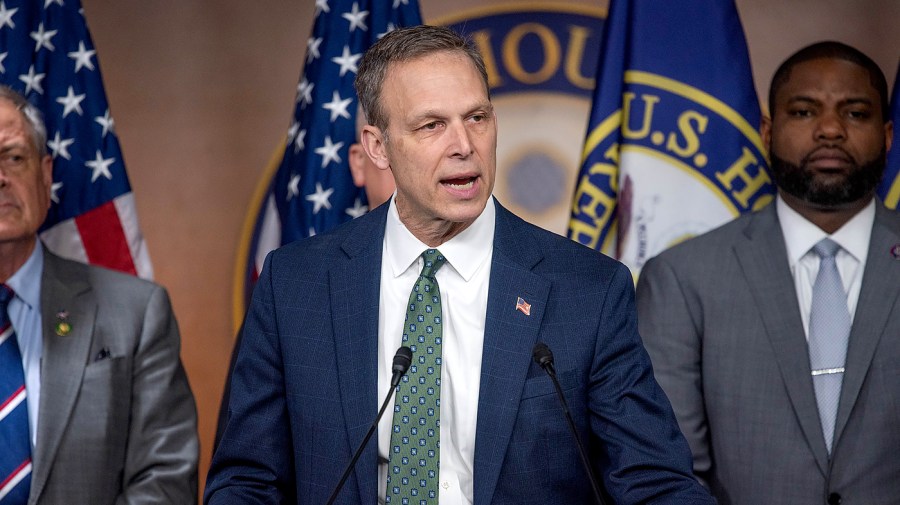Freedom Caucus says ‘no further discussion’ on debt ceiling until Senate passes House GOP bill
The House Freedom Caucus is calling for “no further discussion” on legislation to raise the debt ceiling until the Senate passes the bill House Republicans approved last month that would pair an increase in the borrowing limit with steep spending cuts.
Senate Majority Leader Chuck Schumer (D-N.Y.) has called the bill “dead on arrival.”
The hard-liner conservative caucus said it adopted its official position on Thursday as debt limit negotiations continued behind closed doors between representatives for Speaker Kevin McCarthy (R-Calif.) and the White House.
“The U.S. House of Representatives has done its job in passing the Limit, Save, Grow Act to provide a mechanism to raise the debt ceiling. This legislation is the official position of the House Freedom Caucus and, by its passage with 217 votes, the entire House Republican Conference,” the caucus wrote.
“The House Freedom Caucus calls on Speaker McCarthy and Senate Republicans to use every leverage and tool at their disposal to ensure the Limit, Save, Grow Act is signed into law. There should be no further discussion until the Senate passes the legislation,” the caucus added.

Rep. Scott Perry (R-Pa.) addresses reporters during a press conference on March 10 with members of the House Freedom Caucus to discuss the debt limit. (Annabelle Gordon)
While Republicans were united behind their debt limit bill, which was intended to bring President Biden to the negotiating table, the Freedom Caucus position could indicate unity behind McCarthy’s strategy is starting to break — posing complications for the negotiations.
However, House Freedom Caucus Chairman Scott Perry (R-Pa.) softened the position in an interview with CBS.
“We’re not saying you can’t continue to talk, but until they’re willing to tell us what they’re willing to do, it’s hard to come to an agreement,” Perry said.
“We should probably compromise on something — but there’s nothing to compromise with. They haven’t asked anything,” he added.
Shortly before the House GOP bill passed, some conservative Republicans — including members of the Freedom Caucus — warned they would not support any legislation that was weaker than the one on the floor last month, which would put McCarthy in a difficult spot if he strikes a compromise and needs to rally support among the GOP conference for the compromise legislation.
Debt limit negotiations kicked into high gear this week after McCarthy and the White House cut out congressional Democrats and Senate Republicans from the talks and selected emissaries to hash out details behind the scenes. The development, which McCarthy hailed as a positive step, came about two weeks out from June 1, the day Treasury Secretary Janet Yellen said the U.S. could run out of cash to pay its bills.
On Thursday, McCarthy struck an optimistic tone, telling reporters, “I see the path that we can come to an agreement.” He noted, however, that the two sides “haven’t agreed to anything yet.”
More debt ceiling coverage from The Hill:
- Conservatives make last-minute push for border security in debt ceiling package
- McCarthy shifts, voices new confidence in debt ceiling deal
- With Biden in Japan, Harris pushes White House message on debt ceiling
- Senate to break for recess as debt ceiling talks heat up
- Democrats warn Biden against cutting debt ceiling deal with McCarthy
House Republicans passed their debt limit proposal — titled the Limit, Save, Grow Act — in a 217-215 vote last month. The legislation would lift the borrowing limit by $1.5 trillion or through March 2024, whichever comes first, and it would implement $4.8 trillion in spending cuts.
The legislation calls for capping federal funding at fiscal 2022 levels, limiting spending growth to 1 percent every year over the next decade, beefing up work requirements for some social programs and clawing back unused COVID-19 funds.
House Republicans have since called on the Senate to take up the measure, but Schumer has called it “dead on arrival.” President Biden also issued a veto threat should it land on his desk. Democrats had initially pushed for a “clean” debt ceiling increase — meaning no conditions are associated with the hike — and said they would discuss federal spending as part of the annual appropriations process.
But the two sides have since come together at the negotiating table and are now racing to come to a consensus and walk the U.S. off the edge of the fiscal cliff.
One sticking point that rose to the forefront this week is work requirements. McCarthy told reporters work requirements for public assistance programs are a red line in negotiations, while Biden said he would not agree to “anything of any consequence” when it comes to the subject.
“I’m not going to accept any work requirements that’s going to impact on the medical health needs of people; I’m not going to accept any work requirements that go much beyond what is already — I voted years ago for the work requirements that exist. But it’s possible there could be a few others, but not anything of any consequence,” he said.
The bill House Republicans passed last month implements stricter work requirements for specific recipients of Medicaid, the Supplemental Nutrition Assistance Program — which was previously known as food stamps — and other federal benefit programs.
Updated at 5:34 p.m.
Copyright 2023 Nexstar Media Inc. All rights reserved. This material may not be published, broadcast, rewritten, or redistributed. Regular the hill posts









